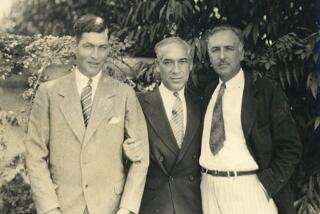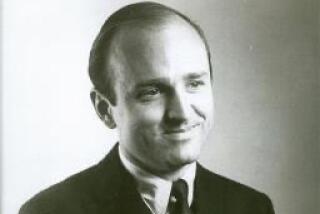Frances Kavanaugh dies at 93; screenwriter of B-westerns
Frances Kavanaugh, one of the few women who wrote screenplays for B-westerns such as “Song of Old Wyoming” and “Wild West” in the 1940s and early ‘50s, has died. She was 93.
Kavanaugh died Jan. 23 at her home in Encino after a long battle with lymphoma, said her husband, Robert L. Hecker.
Between 1941 and 1951, Kavanaugh wrote more than 30 western scripts for cowboy stars such as Tom Keene, Bob Steele, Eddie Dean, Jimmy Wakely, Ken Maynard and Duncan Renaldo.
“Frances Kavanaugh was a bit unique in her profession,” Boyd Magers, editor and publisher of Western Clippings, a western-film publication, said in an e-mail.
“In the ‘40s, screenwriters for B-westerns were primarily men, as they wrote the action-packed, hard-riding scripts,” Magers said. “Frances was among a small minority of women who broke into writing Saturday matinee B-westerns and succeeded at having a solid career.”
Born in Dallas on Feb. 5, 1915, and raised in Houston, Kavanaugh grew up around ranching, cowboys and riding horses -- a background, she said in a 2002 interview with Magers, that “gave me the feeling of westerns.”
Kavanaugh studied accounting at the University of Texas before moving to Los Angeles with her parents in 1940.
She was attending director Max Reinhardt’s drama workshop when, for fun, she began writing two-person dialogue sketches for her fellow acting students.
Her sketches caught the eye of a workshop visitor, independent B-western producer-director-writer Robert Tansey, who offered her a job with his production company on the Monogram lot.
Kavanaugh began by polishing dialogue on scripts in an office that adjoined Tansey’s office. But one day, she recalled in the 2002 interview, she found she couldn’t continue.
Tansey came out and said: “I don’t hear you typing, what happened?”
“I can’t work on this script,” Kavanaugh said.
“Why?”
“Because it’s too terrible. It’s the worst thing I’ve ever read; I cannot fix it.”
Saying that his criterion is “whoever criticizes has to do it better according to five people,” Tansey told her, “You write the script.”
Kavanaugh went home, “typed all night and came back the next day with about 85 pages, close to 100 when I got through, and gave it to him. He took it and read it and came back and said, ‘I’m not going to have the five judges. I think yours is better! From now on, you’re going to be my scriptwriter.’ ”
Her first screenplay was for the 1941 Keene western “Dynamite Canyon.”
Kavanaugh was dubbed “the Cowgirl of the Typewriter,” and her script for the 1945 western “Song of Old Wyoming,” starring singing cowboy Dean, had an unexpected consequence.
At Tansey’s suggestion, Kavanaugh wrote a bullwhip into the script for a character played by an actor named Al LaRue.
The character caught on with the young Saturday matinee audiences and, after a spate of fan mail, the unknown supporting player soon began starring in his own westerns as the whip-wielding, black-outfitted Lash LaRue.
After marrying Hecker in 1951, Kavanaugh and her writer-husband collaborated on television scripts for several years before she gave up writing to raise her family.
When her children began going to college, Kavanaugh enrolled at Cal State Northridge, where she earned a bachelor’s degree in art and a master’s degree in psychology. She later worked for several years in art therapy for dysfunctional children.
In 1997, Kavanaugh was honored by what is now known as the Autry National Center’s Museum of the American West in Los Angeles, to which she donated her old typewriter, scripts, press materials and the cowgirl western clothes she wore while working at Monogram.
In addition to her husband of 58 years, she is survived by her children, Robbie-Jane Wedeen and Robert K. Persson-Hecker; her sister, Jane Borrmann; and four grandchildren.
Services were private.
More to Read
Start your day right
Sign up for Essential California for news, features and recommendations from the L.A. Times and beyond in your inbox six days a week.
You may occasionally receive promotional content from the Los Angeles Times.






